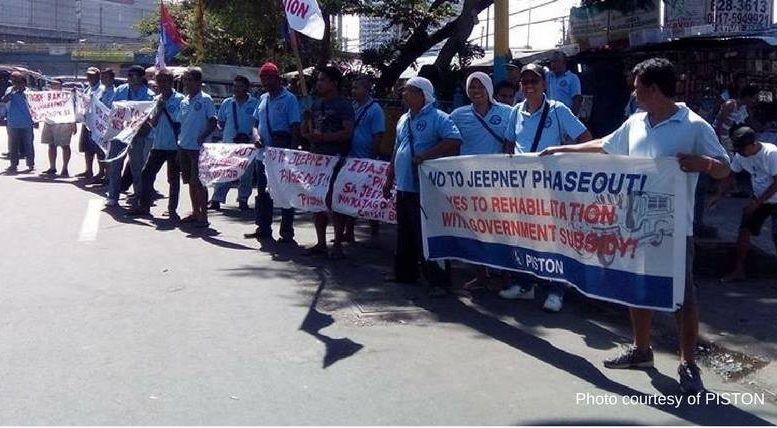SOLIDARITY STATEMENT ON NATIONWIDE TRANSPORT STRIKE
The Ecumenical Institute for Labor Education and Research (EILER) is in solidarity with the striking jeepney drivers and operators led by the Pagkakaisa ng mga Samahan ng mga Tsuper at Operator Nationwide (PISTON) and No to Jeepney Phaseout Coalition.
On the modernization through jeepney phase out
The jeepney modernization scheme of the Department of Transportation (DOTr) and the Land Transportation Franchising and Regulatory Board (LTFRB) is carried over from the Aquino regime’s Mega Manila Dream Plan and will not benefit the hundreds of thousands of jeepney drivers, operators, and urban poor.
The Dream Plan is a result of the recommendations from the Japan International Cooperation Agency (JICA), one of the largest sources of official development assistance (ODA) loans particularly in infrastructure development and transport sector. The planned modernization is another scheme of public-private partnership (PPP) carefully wrapped in neoliberal green agenda.
The plan wants to remove and replace all passenger jeepneys and replace these with more expensive electric and Euro-4 vehicles, which cost around PHP 800,000 to 1.6 million. The government proposes to loan the jeeps to those who cannot afford the electric vehicle through bank financing. Similar to other PPP projects, there is financial risks involved and only the profit of the financiers is guaranteed.
The plan also forces the operators to enter the Fleet Management Program whose main functions are outsourced to and operated by private corporations. LTFRB in defense of the modernization scheme even went as far as curtailing the right of jeepney drivers and operators to strike as board member Aileen Lizada threatened them with suspension or cancellation of franchises if proven that they have participated in the February 6 strike.
In addition, the modernization scheme does not tackle oil overpricing and value-added tax on basic goods and services, which only worsen the lives of Filipino transport drivers and operators. The recent fare hike is also another burden to the commuters. We do not oppose improvements of services but we do oppose the transfer of PUJ operations to big private businesses. This will not solve the poor living conditions of most jeepney drivers, instead robs them of their livelihood.
On jeepneys and urban air pollution
Public transport in the Philippines, including the most widely-used land transport system, remains underdeveloped, inefficient and unsustainable. Just like any other vehicle, jeepneys contribute to air pollution. However, the jeepney, a symbol of the Philippine culture and a popular and cheap choice for commuters, comprises only 2 percent of all land vehicles in the country. This is why we must also consider the emission from other types of vehicles and other large sources of pollutants such as coal and electric plants and industrial wastes generated by big foreign companies.
The rise of international transportation networks such as Grab and Uber does minimal to solve air pollution even with their ride sharing options. In fact, these networks are largely unregulated, indirectly increasing car-ownership and resulting to more cars on the road with dead mileage and additional emissions.
To improve air quality in urban areas, the government must first improve traffic management by creating efficient mass transit system for the public, that is not in the hands of profit-oriented corporate entities. There are also many ways to improve the jeepneys, which by the way are built in our backyard, without phasing them out in favor of corporations with vested interest.
On sustainability and long-term solution
What we propose is to address the root cause of poverty and inequality. Under neoliberal globalization, labor flexibilization and modernization schemes have become rampant resulting to job insecurity. With 4.7 percent conservative estimate of unemployment rate in the country and whopping 7.7 million (18 percent) underemployed Filipinos in January 2017 alone, the productive forces remain stagnant and industrial development is stunted. Over 30 million Filipinos consider themselves as extremely poor, while the total net worth of the richest continue to grow. The economy also suffers backwardness and underdevelopment, being export-oriented and import-dependent.
Minimal decent and secure jobs are created to absorb the growing labor force of the urban and rural poor, including peasants and farm workers. Meanwhile, the big landlords and transnational corporations continue to extract the wealth of the nation through speculative modernization schemes. Without genuine national industrialization, majority of the Filipino workers will remain vulnerable and helpless against low-productivity informal sector employment, measly wages, and precarious employment.
There should be no compromise when it comes to the livelihood and welfare of the workers. Financial aids merely serve as band aid solutions. The socioeconomic impacts of modernizing the public transport system must first be taken into consideration. There are 600,000 jeepney drivers and more than 250,000 jeepney operators nationwide at risk of being displaced and dispossessed through the jeepney modernization program. Most of them are under oppressive “boundary” arrangements, earning even less than the mandated minimum wage. They, too, have families relying on them for support.
We demand that the government uphold the workers’ rights and the national economic interest by amending department orders, plans, and agreements that are bias towards capitalists and public-private partnerships. We must advocate for pro-poor comprehensive urban and rural transportation planning that complements national industrialization and genuine agrarian reform. The government must resume with the peace talks and push for the Comprehensive Agreement on Social and Economic Reforms (CASER), which tackles land reform and workers’ welfare.

